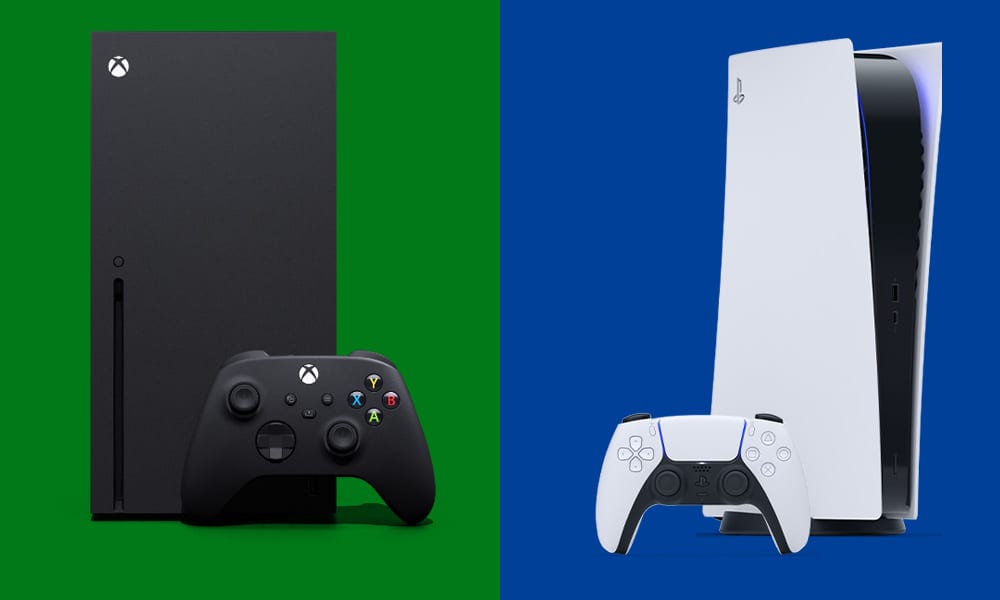If you’re looking to get a new gaming console this year, your best options are the PS5 and the Xbox Series X. These next-gen consoles are the fastest and offer the best graphics. In order to help you choose, here’s everything you need to know about the PS5 vs the Xbox Series X, including the specs, games, price, and more.
PS5 vs Xbox Series X: Specs
The PS5 and the Xbox Series X have very similar specs. The only real differences come down to the CPU, GPU, and hard drive. While the Xbox Series X appears to beat the PS5 on paper, the differences in specs are barely noticeable in real-world tests.
The PS5 and Xbox Series X both come with 16 GB of GDDR6 RAM, which is twice the capacity of the PS4 and Xbox One S. Both next-gen consoles also support 4K gaming at 120 frames per second (fps). Also, the PS5 and Xbox Series X feature Ultra-HD Blu-Ray optical drives that are compatible with 8K displays.
CPU
The PS5 and the Xbox Series X both feature a custom-designed eight-core AMD Zen 2 CPU. However, the processors in each gaming console are a little different. The Xbox Series X runs at a fixed CPU clock speed of 3.8GHz, while the PS5 runs at 3.5GHz with variable frequency.
While the Xbox has a slightly more powerful CPU, the PS5 uses variable frequency, which means it continuously runs in boost mode. So, instead of running on a constant frequency and letting the power vary based on the workload, the PS5 runs on constant power and let the frequency vary based on the workload.
Since the CPU is basically the brain of a console, the PS5’s processor might lead to some dips in performance every once in a while. However, Sony assured gamers that the performance should rarely drop unless you are running extremely high workloads.
Also, if you measure the clock speed with simultaneous multi-threading (SMT) enabled, the difference between the CPUs clock speeds is almost negligible.
GPU
The PS5 has a 10.28 teraflop AMD RDNA 2 GPU with 36 compute units (CUs), while the Xbox Series X has a 12.15 teraflop AMD RDNA 2 GPU with 52 CUs. However, the PS5 uses a variable GPU clock speed, while the Xbox uses a fixed GPU clock speed.
The term teraflop (TFLOP) refers to how many computer calculations a GPU is able to process. A higher teraflop count usually means a console can handle more operations per second. With its 12.155-teraflop power, the Xbox Series X is around 1.18x as powerful as the PS5, at least on paper.
The Xbox Series X also has 52 compute units (CUs) compared to the PS5, which only has 36 CUs. So, the Xbox Series X has 1.5 times the graphics power. This means the Xbox Series X can process more data quicker than the PS5.
On the other hand, the PS5 can achieve much faster speeds by using its variable GPU clock speed. While the Xbox Series X GPU is locked at 1.825 GHz, the PS5 GPU can operate at 2.23 GHz. However, the PS5 will not operate at this frequency all the time.
When it comes to real-world tests, the differences between the PS5 and the Xbox Series X are barely noticeable. According to real-world tests, both consoles ran ‘Watch Dogs Legion’ at the exact same frame rate, with almost no difference in performance. Both consoles also offer ray tracing, so the two can provide lifelike lighting.
When it comes down to it, the CPU and GPU of both consoles are different, but they can achieve the same results. It just depends on which games you are playing.
In order to take full advantage of the next-gen consoles, you will need to connect them to your TV with an HDMI 2.1 cable. This will allow you to transmit more data at faster speeds than older HDMI cables.
Storage
The PS5 and Xbox Series X both have solid-state hard drives (SSDs), which is a big upgrade from the last-gen consoles that used traditional hard disk drives (HDDs). However, the PS5 has a faster SSD, which means that it will load certain games faster.
The PS5’s SSD is capable of up to 5.5GB/s raw output, while the Xbox Series X outputs 2.4GB/s of raw data. That means the PS5’s drive is twice as fast as the Xbox Series X. That means load times will be much shorter with games optimized for the next-gen console.
According to real-world tests, the PS5 does have faster loading times than the Xbox Series X, but only for newer games that are optimized for the consoles. The Xbox Series X actually has faster loading times for older games running on backward compatibility mode.
If you want to know more about the difference between HDDs and SSDs, check out our in-depth guide here.
Expandable Storage
When it comes to storage space, the Xbox Series X offers 1TB compared to the PS5, which only offers 825GB of storage space. However, both consoles come with expandable storage, so you’ll have plenty of room for your games.
The PS5 has an M.2 NVMe slot that you can use to expand your storage capacity. These are the same M.2 drives that you can buy when building a computer, so it’s possible to expand your storage by several terabytes. However, this drive bay is currently disabled because there are no SSDs on the market that are fast enough for the PS5.
Sony is currently conducting compatibility tests with M.2 SSDs, and they are expected to announce when this drive bay can be used later this year.
The Xbox Series X has a proprietary expansion slot that is easier to access. This means you can take your games with you wherever you go. Xbox claims that the expansion cards maintain the same performance and speed as the internal drives. However, a 1TB expansion card currently costs $219, which is nearly half the price of the console.
You can also use an HDD to expand your storage on each console via a USB port. However, this will not be nearly as fast as the internal SSD, so you might only want to use it for older games that you play on backward compatibility.
PS5 vs Xbox Series X: Games
When it comes to games, the PS5 offers more exclusives than the Xbox Series X at launch. Sony has already kicked off the ‘Demon’s Souls’ remake, ‘Spider-Man: Miles Morales,’ and ‘Astro’s Playroom.’
On the other hand, the Xbox Series X did not have any new exclusive games at launch. Instead, Microsoft released a list of 30 old games that were optimized for the next-gen console. However, with Microsoft’s continued acquisitions of game studios like Bethesda and Double Fine, the future game lineup of the Xbox Series X also looks promising.
Both consoles also offer backward compatibility. You can play almost all PS4 games on your PS5. All games from the Xbox One, select Xbox 360 games, and original Xbox games are also available to play on the new Xbox Series X.
One other thing that sets the PS5 apart is it can be played with VR, so players can quickly connect their PlayStation VR to the PS5 and enjoy supported games. Microsoft did not make VR possible for the Xbox Series X.
PS5 vs Xbox Series X: Design
The Xbox Series X and the PS5 have a very different design. While the Xbox has a simple black box design, the PS5 is a little more visually appealing.
With its beefy CPU and GPU, the Xbox Series X produces a lot of heat. In order to combat that, Microsoft designed the Xbox Series X with airflow in mind. The console has a large fan on the top that pushes air up and away from the components. That means you shouldn’t have anything obstructing the top of the console.
The PS5 is much taller and thinner than the Xbox Series X, which means it is a little harder to add to your TV stand. The Xbox Series X is 11.9 inches tall and 5.9 inches wide and deep. The PS5, on the other hand, is over 15.3 inches tall, 3.6 inches wide, and 10.2 inches deep.
When it comes to ports, the PS5 and the Xbox Series X both have three USB-A 3.1 ports, Ethernet, and an HDMI 2.1 out terminal.
PS5 vs Xbox Series X: Price
The Xbox Series X and the PS5 both have a starting price of $499. There are also cheaper variants coming from the two brands. There’s a digital-only PS5 that’s priced $399 and a cheaper Xbox called the Series S priced at $299.
Once you choose between the PS5 and the Xbox Series X, check out our list of the best TV mounts to complete your home theater.
HelloTech editors choose the products and services we write about. When you buy through our links, we may earn a commission.




